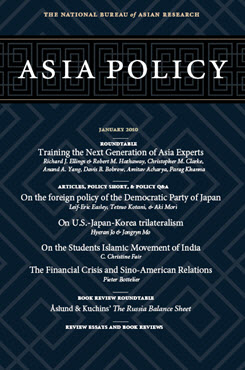Does the United States Need a New East Asian Anchor?
The Case for U.S.-Japan-Korea Trilateralism
This article evaluates the value of U.S.-Japan-Korea (UJK) trilateralism as an anchor of Asian regional architecture by examining the history of trilateral partnerships, alternative regional groupings, and geopolitical and domestic circumstances.
EXECUTIVE SUMMARY
This article evaluates the value of U.S.-Japan-Korea (UJK) trilateralism as an anchor of Asian regional architecture by examining the history of trilateral partnerships, alternative regional groupings, and geopolitical and domestic circumstances.
MAIN ARGUMENT
The trilateral partnership among the U.S., Japan, and Korea has significantly contributed to the peace and security of East Asia over the last 50 years. This article argues that with additional improvements UJK trilateralism can serve as an anchor for a cooperative framework for regional security in Asia. New leadership in all three countries provides an opportunity to review existing policies and develop long-term strategies for regional architecture. UJK trilateralism compares favorably with alternative regional groupings such as Japan-China-Korea or U.S.-Japan-India. A well-crafted UJK trilateral partnership therefore has the potential to serve as an example-setting cooperative mechanism in the region.
POLICY IMPLICATIONS
- An enhanced UJK partnership, based on the traditional bilateral U.S.-Japan and U.S.-Korea alliances, can effectively coordinate addressing regional security contingencies.
- A trilateral UJK partnership can contribute to the resolution of the North Korea issue by reviving the Trilateral Coordination and Oversight Group (TCOG) and integrating it into the existing six-party talks.
- The current economic and financial setbacks should not deter the UJK countries from setting up a bold and creative economic partnership that looks forward to an emerging “Pacific century.”
- The UJK trilateral partnership can go beyond traditional security issues and meaningfully engage broader issues of development, democratic governance, and human rights.
About Asia Policy
Asia Policy is a peer-reviewed scholarly journal presenting policy-relevant academic research on the Asia-Pacific that draws clear and concise conclusions useful to today’s policymakers. Asia Policy is published quarterly in January, April, July, and October and accepts submissions on a rolling basis. Learn more


